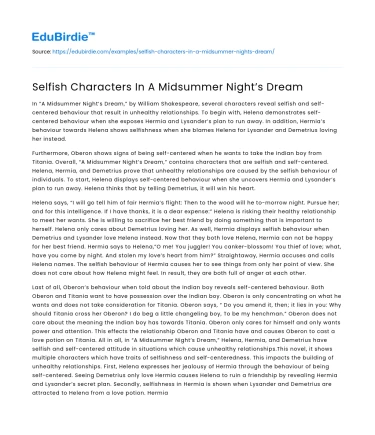In “A Midsummer Night’s Dream,” by William Shakespeare, several characters reveal selfish and self-centered behaviour that result in unhealthy relationships. To begin with, Helena demonstrates self-centered behaviour when she exposes Hermia and Lysander’s plan to run away. In addition, Hermia’s behaviour towards Helena shows selfishness when she blames Helena for Lysander and Demetrius loving her instead.
Furthermore, Oberon shows signs of being self-centered when he wants to take the Indian boy from Titania. Overall, “A Midsummer Night’s Dream,” contains characters that are selfish and self-centered. Helena, Hermia, and Demetrius prove that unhealthy relationships are caused by the selfish behaviour of individuals. To start, Helena displays self-centered behaviour when she uncovers Hermia and Lysander’s plan to run away. Helena thinks that by telling Demetrius, it will win his heart.
Save your time!
We can take care of your essay
- Proper editing and formatting
- Free revision, title page, and bibliography
- Flexible prices and money-back guarantee
Helena says, “I will go tell him of fair Hermia’s flight: Then to the wood will he to-morrow night. Pursue her; and for this intelligence. If I have thanks, it is a dear expense:” Helena is risking their healthy relationship to meet her wants. She is willing to sacrifice her best friend by doing something that is important to herself. Helena only cares about Demetrius loving her. As well, Hermia displays selfish behaviour when Demetrius and Lysander love Helena instead. Now that they both love Helena, Hermia can not be happy for her best friend. Hermia says to Helena,”O me! You juggler! You canker-blossom! You thief of love; what, have you come by night. And stolen my love’s heart from him?” Straightaway, Hermia accuses and calls Helena names. The selfish behaviour of Hermia causes her to see things from only her point of view. She does not care about how Helena might feel. In result, they are both full of anger at each other.
Last of all, Oberon’s behaviour when told about the Indian boy reveals self-centered behaviour. Both Oberon and Titania want to have possession over the Indian boy. Oberon is only concentrating on what he wants and does not take consideration for Titania. Oberon says, “ Do you amend it, then; it lies in you: Why should Titania cross her Oberon? I do beg a little changeling boy, To be my henchman.” Oberon does not care about the meaning the Indian boy has towards Titania. Oberon only cares for himself and only wants power and attention. This effects the relationship Oberon and Titania have and causes Oberon to cast a love potion on Titania. All in all, in “A Midsummer Night’s Dream,” Helena, Hermia, and Demetrius have selfish and self-centered attitude in situations which cause unhealthy relationships.This novel, it shows multiple characters which have traits of selfishness and self-centeredness. This impacts the building of unhealthy relationships. First, Helena expresses her jealousy of Hermia through the behaviour of being self-centered. Seeing Demetrius only love Hermia causes Helena to ruin a friendship by revealing Hermia and Lysander’s secret plan. Secondly, selfishness in Hermia is shown when Lysander and Demetrius are attracted to Helena from a love potion. Hermia immediately expresses her anger on Helena and starts an argument within their friendship.
Lastly, Oberon challenges his relationship with Titania when he exhibits self-centered behaviour. Oberon’s actions clearly show what extent he would go to for power. In summary, “A Midsummer Night’s Dream” by William Shakespeare show unhealthy relationships built from many selfish and self-centered characters.






 Stuck on your essay?
Stuck on your essay?

